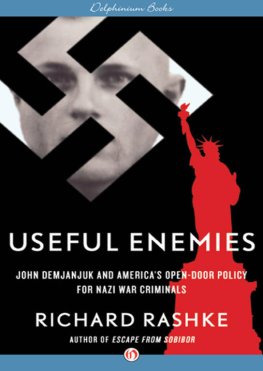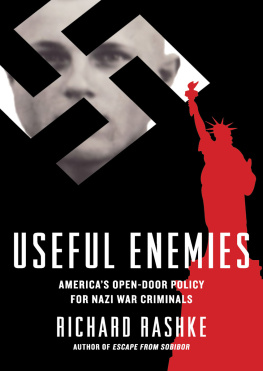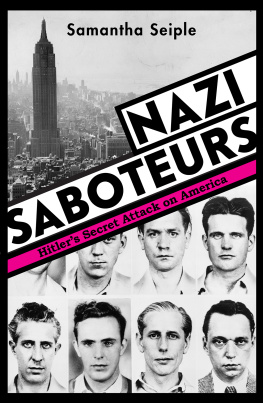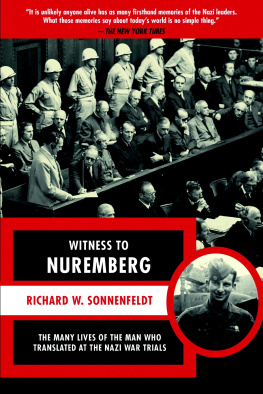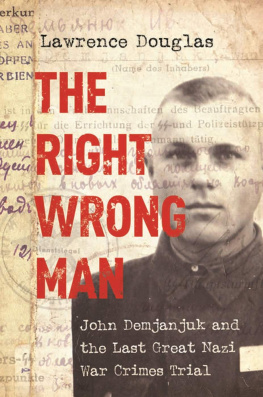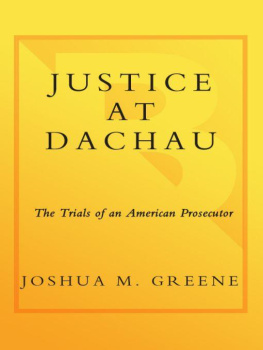Richard Rashke
USEFUL ENEMIES
John Demjanjuk and Americas Open-Door Policy for Nazi War Criminals
INTRODUCTION
History, Like Life, Is Messy
In November 2009, orderlies wheeled an eighty-nine-year-old former American citizen, John Demjanjuk, into a Munich courtroom on a gurney to face charges that he helped the Nazis murder 29,060 Jews at the Sobibor death camp in eastern Poland during World War II.
Why did it take almost sixty years for the United States to find and extradite John Demjanjuk for trial in Germany as a Nazi collaborator?
Finding an answer to this often-asked question is like trying to solve a Rubiks Cube. Historical forces, moral behaviors, legal issues, and matters of survival must be separated and realigneda daunting task when an individuals wartime actions and a countrys postwar judgments of those actions are so intertwined.
In the United States, Israel, and finally in Germany, John Demjanjuk stood accused of being a Nazi collaborator. Yet if war is as much about survival as it is about killing, does wartime create its own version of what is right and wrong, based on an individuals right of survival? If so, was John Demjanjuk a collaborator or simply a survivor?
At the same time that postwar America was pursuing John Demjanjuk and other alleged Nazi collaborators in the courts, it was also employing and protecting former Nazis and Nazi collaborators. Was Americas use and shielding of these war criminals a repugnant but necessary and pragmatic choice to secure the nation during the Cold War? Or was it illegal, unethical, and immoral? And were its pick-and-choose decisions about which Nazi collaborators to try, deport, or extradite an exercise in cynicism and hypocrisy?
If the end justifies the means, does a morally acceptable end justify any means? Is there a line of pragmatism and political expediency, albeit fuzzy and shifting, that an individual or a nation should not cross? If so, who decides where to draw that line?
The panel of seven judges in Munich rendered a final answersubject to appealin the case of John Demjanjuk and established a war crimes precedent in the process. For the first time, a German court convicted a Nazi-era war criminal without either documentary or eyewitness evidence that he had personally killed anyone. That precedent sent German prosecutors scurrying back to their file cabinets in search of other alleged Nazi collaborators who had aided and abetted in the murder of civilians, without proof that they had ever pulled a trigger. As a result of the Demjanjuk conviction, there may be more war crimes trials in Germany.
For John Demjanjuk the long journey to Munich began in 1920 in a tiny Ukrainian village.
Fleshed out with the history of the times, here is John Demjanjuks story. It is cobbled from official records bearing his signature and his sworn statements to prosecutors and courts in the United States and Israel.
Iwan Demjanjuk{Iwan is the spelling of the common name Ivan.} was born on April 3, 1920, in the Ukrainian village of Dubovi Makharintsi. With a population of about three hundred, it was not on any map. The village was near Kiev, one of the oldest cultural centers in Eastern Europe. But as important as Kiev was to Ukrainian national identity, it offered nothing to a barefoot boy born into a farming family and destined to be a farmer himself.
Iwan never had a chance to attend Kievs famous Taras Shevchenko National University, or the Kiev Polytechnic Institute, or the Kiev-Mohyla Academy. He got as far as fourth grade in the village school before being drafted to work on a communist collective farm (kolkhoz), where he slowly advanced from horse and plow to tractor.
Iwan was the epitome of a survivor. He lived through Joseph Stalins artificially created famine of 193233 (the Holodomor), during which three to four million Ukrainians died of starvation. The famine hit children like Iwan the hardest. As one observer described them: You could see each bone in their arms and legs protruding from the skin, how bones joined, and [how] the entire skeleton was stretched over with skin that was like yellow gauze. And the childrens faces were tormented, just as if they were seventy years old. And the eyes. Oh, Lord!
The famine kept the Demjanjuk family teetering on the brink of starvation for fifteen months and made a lasting impression on thirteen-year-old Iwan. It became a compass point in his lifes journey, toughened his will to live, and taught him skills he would need to survive the Nazi earthquake about to tear Europe apart. Iwan also managed to dodge Stalins maniacal purges of the 1930s and early 1940s, during which an estimated 3.3 million intellectuals, political activists, and Communist Party leaders, whose loyalty was under suspicion, were executed or imprisoned in the Siberian gulags. Among them were thousands of Ukrainian journalists, poets, teachers, wealthy landowners, and clergymen. Iwan survived the purges because Stalin feared the pen and the tongue, not the tractor and its driver.
In the end, the dictator paid a heavy price for raping Ukraine. The Holodomor, the purges, and state-mandated atheism sowed the seeds of hatred deep in Ukraines Christian heart.
Like his father, Nikolai, before him, Iwan was drafted into an artillery division of the Red Army. It galled the young man that he was forced to defend Stalin and communism, but the alternative was death as a traitor. And like his father, who lost several fingers during World War I (probably from frostbite), Iwan too was scarred by war. He suffered a shrapnel wound in the back from the premature explosion of an artillery shell. The paralyzing wound was so serious that he spent nearly a year in hospitals before being sent back into battle at Kerch, a Ukrainian harbor city in Crimea.
For the German Reich, the Kerch port was a tempting plum. After heavy fighting, it captured the city in November 1941. But not for long. Mounting a surprise attack from the sea, the Reds recaptured Kerch a month later, only to have the German navy retake it once again the following spring. During the battles for Kerch, the Germans killed or took as prisoners more than 160,000 Red Army soldiers. Iwan was one of the survivors.
Because Stalin distrusted the loyalty of his Christian soldiers, Soviet military law required Iwan to kill himself rather than be taken prisoner. POWs could be tortured for military information, flipped to fight against the Red Army, or used as labor cogs in the Reichs war machine. For twenty-two-year-old Iwan, suicide was not only a sin; it was the ultimate act of loyalty to the atheistic government he hated. As a matter of conscience and survival, Iwan chose to take his chances as a German POW.
The capture of Soviet soldiers presented the Reich with a huge problem. It had several million Russian POWs but no system to process them, not enough shelters and food, and no medicine or doctors. Conditions in the jerry-built POW camps in western Ukraine and eastern Poland were so atrocious that prisoners resorted to digging holes in the ground to keep warm and to eating the frozen dead for dinner.
In an attempt to buy time, the German SS (Schutzstaffel), a nonmilitary protection squad, opened a transit camp in Rovno, a rail transportation hub in western Ukraine, which offered the Reich army easy access to Germany and its occupied territories. During the winter of 194142, an estimated two million Red Army POWs died in Rovno from starvation, exposure, typhus, and dysentery before Berlin decided to put them to work, as Stalin had feared.
Adolf Hitler assigned the task of building and managing the Reichs more than six thousand transit, POW, concentration, labor, and death camps to the SS. SS officers selected the healthiest POWs and penned them inside hastily constructed camps in the Reich-occupied territories until they could be placed in proper labor camps. Iwan was sent first to Rovno in June 1942, then to an outdoor holding camp in Chelm, Poland, a historic city founded in the ninth century and only a twenty-minute train ride from the Bug River, which divided Poland and the Soviet Union. Chelm served as a cultural center for both Poles and Jews, who had lived in relative harmony until Hitler made it legal to rob and kill Jews.

